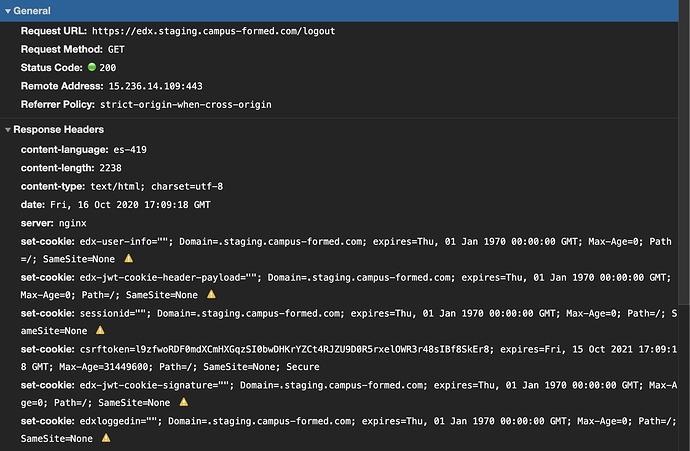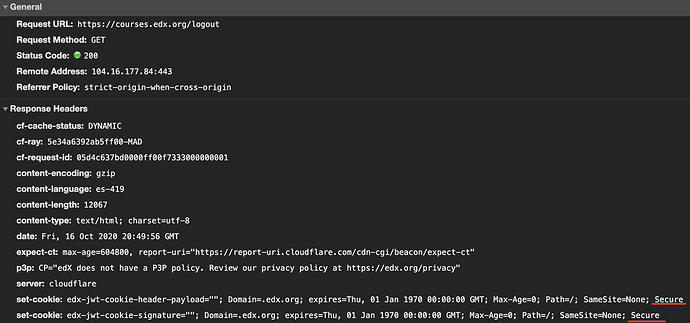Hi. This is mainly to vent out, as it took some hours to debug and I’m not sure whose problem is it; and as a heads-up to @regis .
This is an issue not of tutor, but of the edx-platform, so I didn’t see fitting to raise an issue in your repo. However, it is not reproducible on courses.edx.org, which has led to me being 100% sure they are not running the codebase at edx/edx-platform/master, which they report they do.
Long story short. When logging in over HTTPS and using django-cookies-samesite config value DCS_SESSION_COOKIE_SAMESITE = "None" (which tutor is using and edx.org very much seems to be), login cookies (edx-logged-in, edx-jwt-cookie-signature, etc) are set with SameSite=None and Secure, as seen in openedx/core/djangoapps/user_authn/cookies.py:
def standard_cookie_settings(request):
...
cookie_settings['secure'] = request.is_secure()
However, when logging out, those cookies are deleted using Django’s response.delete_cookie(), which does not set the Secure attribute:
for cookie_name in ALL_LOGGED_IN_COOKIE_NAMES:
response.delete_cookie(
cookie_name,
path='/',
domain=settings.SESSION_COOKIE_DOMAIN
)
So, at least using a recent version of Chrome, the logged in cookies are not deleted, because they have SameSite=None but not the Secure attribute (including, again, the JWT cookies):
That means that any MFA using the JWT cookies to authenticate (looking at the edx/frontend-platform code, that would mean all of the official ones) will remain logged in when the user logs out from the LMS. That’s not only a functional issue, but potentially a security one.
HOWEVER, trying to reproduce this in edx.org, it’s clear that they set the Secure attribute on the log out cookies, so this issue does not arise:
I’ve reviewed many branches, tags, docs and Jira issues trying to find if/when this was reported/fixed, with no avail.
In the end, this was very easy to fix once found, just changing a few lines in openedx/core/djangoapps/user_authn/cookies.py to match the behaviour at log in:
def delete_logged_in_cookies(response, request):
for cookie_name in ALL_LOGGED_IN_COOKIE_NAMES:
response.set_cookie(
cookie_name,
'',
path='/',
domain=settings.SESSION_COOKIE_DOMAIN,
secure=request.is_secure(),
max_age=0,
expires=datetime.datetime.utcfromtimestamp(0)
)
return response
Again, I’m aware this is not an issue with tutor but with edx-platform. However, seeing that it has been shadowly fixed in the production edx.org deployment, and that work is being done with MFAs by @regis (https://github.com/overhangio/tutor-gradebook), I hope at least to save a headache to some poor developer if they face this issue and somehow end up here.
Anyway, if anyone knows what’s the right thing to do in a situation like this, I’m all ears.
Cheers.



 I understand that your solution comes from the actual implementation of
I understand that your solution comes from the actual implementation of